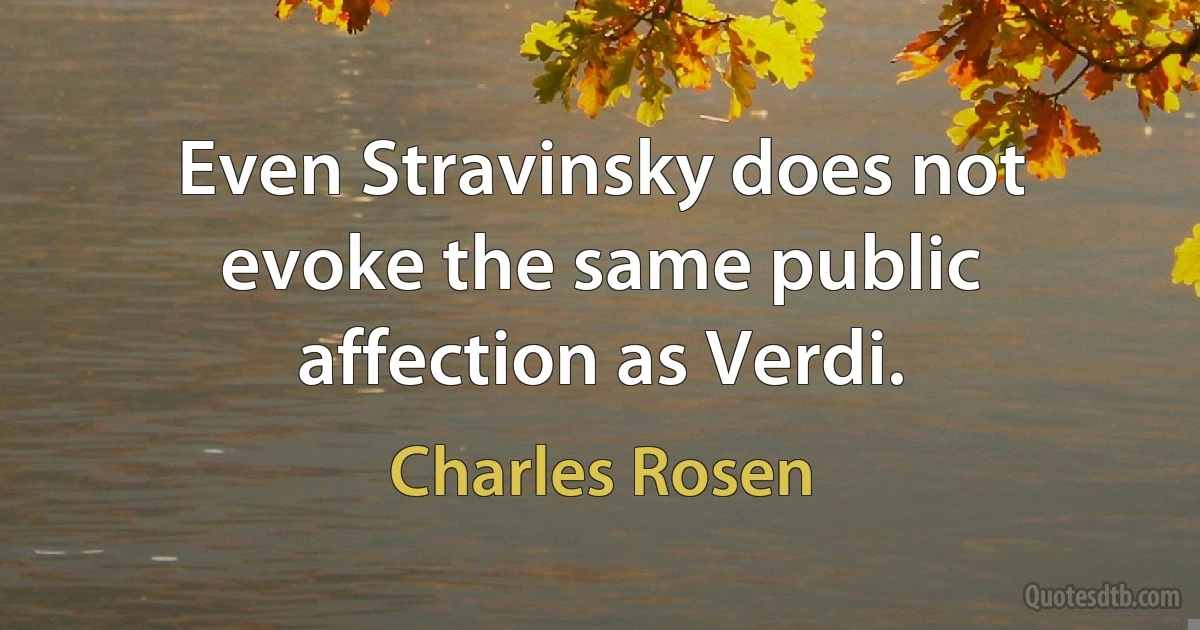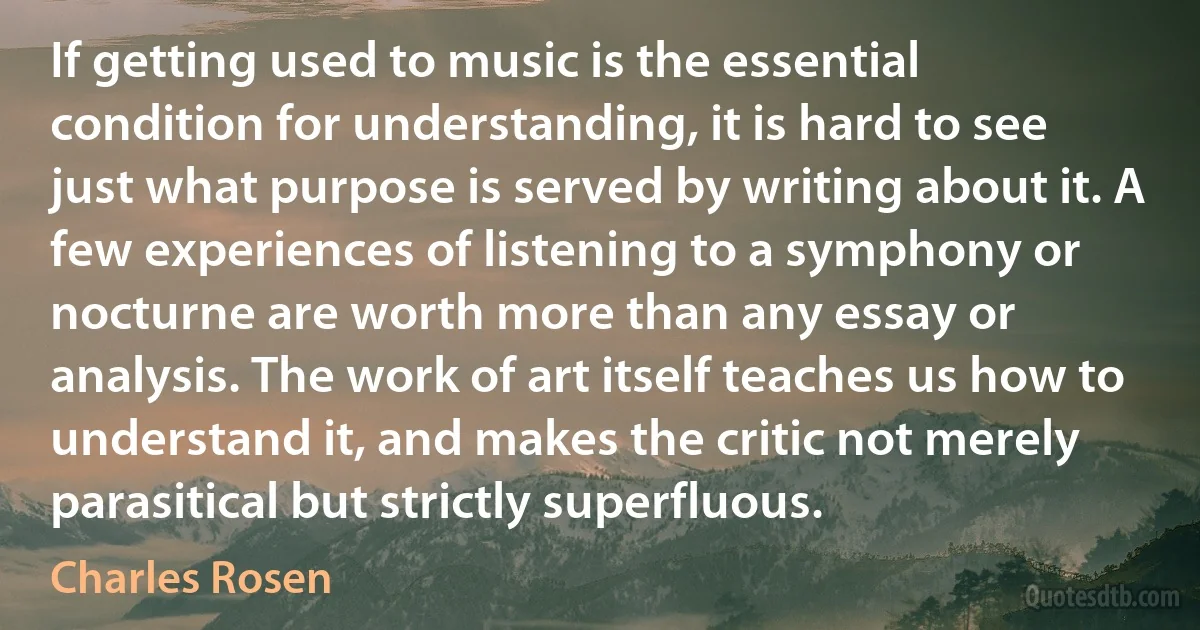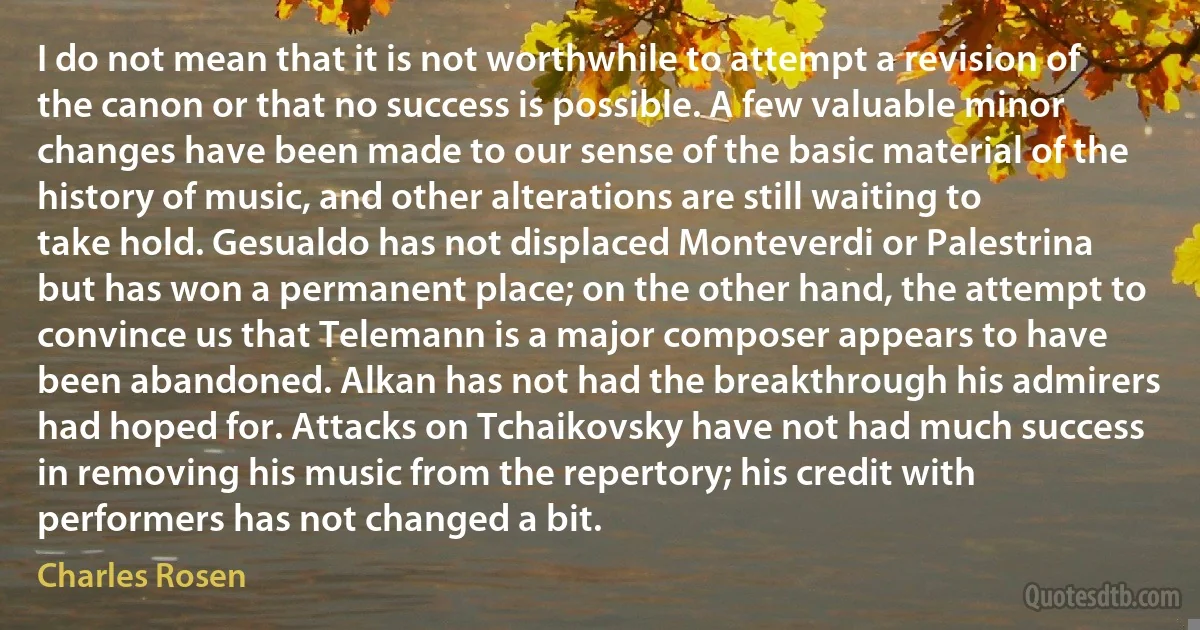Charles Rosen quotes
Mathematicians tells us that it is easy to invent mathematical theorems which are true, but that it is hard to find interesting ones. In analyzing music or writing its history, we meet the same difficulty, and it is compounded by another. For whom is it interesting? To paraphrase a famous remark of Barnett Newman, musicology is for musicians what ornithology is for the birds.

Charles Rosen
The world of Debussy is a seductive oasis, and it is hard to leave it after spending many days immersed in its atmosphere. Playing Debussy-or any other composer with a strong and idiosyncratic personality-affects not only one's cast of mind but the physical disposition as well, the way the muscles work and the fingers come into contact with the ivories.

Charles Rosen
The opposition between structure and sonority in music is almost as misleading as that between line and color in the visual arts. Baudelaire insisted, correctly, that Delacroix was one of the three greatest draftsmen of the century, and emphasized his mastery of line. In the same way, a study of Chopin demonstrates the intimate relation between line and color in music.

Charles Rosen
The song cycle is the most original musical form created in the first half of the nineteenth century. It most clearly embodies the Romantic conception of experience as a gradual unfolding and illumination of reality in place of the Classical insistence on an initial clarity. The form of Schubert's song cycle is not less precise than that of a Classical sonata, but its precision is only gradually comprehended as it unfolds.

Charles Rosen
For Beethoven, music was still shape, realized and inflected by instrumental sonority: other realizations may be as absurd as arrangements of the Hammerklavier, for example, always are, but the musical conception takes precedence over its realization in sound. The sonority serves the music. For Schumann, however, as for Chopin and Liszt, the conception was worked out directly within the sonority as a sculptor works directly in clay or marble. The instrumental sound is shaped into music.

Charles Rosen
Mendelssohn was the greatest child prodigy the history of Western music has ever known. Not even Mozart or Chopin before the age of nineteen could equal the mastery that Mendelssohn already possessed when he was only sixteen. Most astonishing is the nature of Mendelssohn's precocious talent: not only a gift for lyrical melodic lines and delicate, transparent textures, but, above all, a control of large-scale structure unsurpassed by any composer of his generation.

Charles Rosen
Schumann is the most representative musical figure of central European Romanticism as much because of his limitations as because of his genius: in his finest works, indeed, he exploited these limitations in such a way that they gave a force to his genius that no other contemporary could attain.

Charles Rosen
The extraordinary stylistic changes of late eighteenth-century music may have provided much of the inspiration for the literature of the turn of the century, but the literary forms that resulted were deeply eccentric. It was these works-paradoxical, anticlassical, often with startlingly unbalanced proportions-which in turn influenced the music of the generation of composers that followed. The most clearly affected by literature and art were Schumann, Berlioz, and Liszt, but neither Mendelssohn nor Chopin remained untouched by literary developments, like the revival of Celtic and medieval poetry, as the overtures of Mendelssohn and the Ballades of Chopin explicitly demonstrate.

Charles Rosen



